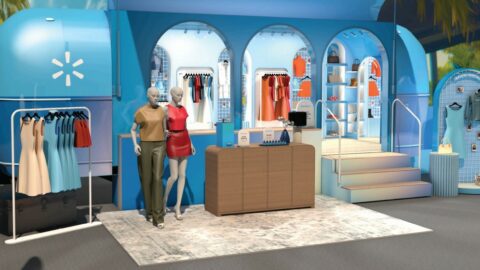As a digital analyst, anthropologist and futurist, Brian Solis strives to get to the heart of not just how the art of doing business has changed, but more importantly, why. In his latest report, titled: Leading Trends In Retail Innovation: Insights from Some of the Most Progressive Retailers Changing The Game, Solis, a Principal Analyst at Altimeter, a Prophet Company, investigates how the “Retail Armageddon” and other headline-dominating trends are changing the industry as we know it.
The report was “shaped based on my experience in innovation and transformation,” Solis explained. “When I’m interviewing people responsible for retail innovation, I’m often surprised, even disappointed, in how very little innovation is taking place. There is no sense of urgency around the topic. So, I put myself in the shoes of someone in this role. If I’m tasked with finding ways to better compete in the digital economy, who would I want to talk to? Who would inspire me to think differently?”
In an exclusive interview with Retail TouchPoints, Solis shared insights into which findings surprised him (and which didn’t). He also delved into:
- Why and how he adjusted the research methodology for this report;
- How internal change can make or break innovation initiatives; and
- The five strategies that all best-in-class retailers engage in.
Retail TouchPoints (RTP): How was this report different from other research you’ve conducted?
Brian Solis: For any report where I discuss digital transformation or innovation, I don’t follow a standard scientific methodology process. I’ve been covering this space for so many years that I know the problems and I know the opportunities, so I felt like I had to humanize the story. I wanted to capture why some companies are failing, why some are succeeding, and determine what the differences were between the two. That was the underlying story arc for this report.
RTP: You interviewed several retail innovation experts and executives who are tasked with driving innovation within their organizations, including Charlie Cole at TUMI and Scott Emmons of the Neiman Marcus Innovation Lab. How did you determine who you wanted to speak with?
Solis: Every industry has a cast of characters who are change agents. I sought them out because I wanted to illustrate to the readers that true innovation is possible. Right now, we’re thinking about innovation in the context of the past. Retail executives overall are looking at what’s possible through a limited lens of perspective. But there are change-makers who are on the front lines and showing what’s possible.
RTP: After you completed your interviews and outside research, which findings surprised you the most?
Solis: What surprised me the most is how pervasive legacy thinking is with any innovation conversation, and how often innovation is tied to trying to push existing models forward. I was also surprised by how frequently retailers are confusing innovation and iteration. Iteration is finding ways to do the same things better. Innovation, however, is finding new ways to introduce new value.
I’ll use Walmart as an example. The retailer has progressed in such a short period of time, with its acquisition of both Jet.com and Bonobos. Walmart is integrating these execs into HQ and has to disrupt how it manages itself. I thought that would be a story that would be more embraced by change agents — to give them purpose and encourage their organizations to rethink their executive ranks and how they work.
RTP: Do you think executives’ inability to look inward and reassess how their organizations operate is holding them back?
Solis: Every great story of innovation starts with a story of personal transformation. Someone has to realize that they’re looking at the world through their beliefs and experiences. It’s like not going to the doctor because you don’t want to know there’s something wrong. But the very reason you go to the doctor is to find out what’s wrong and, in turn, feel better and be healthier. We talk of change but we don’t talk of change within ourselves — that’s the problem.
These retailers are coming off decades of huge profitability based on old business models. These models were changing all along; they just never saw it because they were too busy reinforcing their own beliefs and conventions. Toys ‘R’ Us is a heartbreaking example of this business reality. It is borderline criminal that private equity firms took $200 million, shut down that company and stole tenure and dividends from lifelong employees. But those are the standards that many of these businesses operate against.
RTP: How should retailers change the ways they work and operate to avoid that kind of fate?
Solis: Unfortunately, the future is sealed for many brands we grew up loving and supporting. Every other brand, however, must start with understanding the customer: Looking at them through a lens of possibility, not cognitive bias. Most companies think of the whole journey map and coming up with solutions that iterate for an existing market, rather than innovating for new markets. The best-in-class brands, however, are looking at outside players like Silicon Valley startups — companies that are looking at the hearts and minds of new consumers and using this insight to pilot new programs and spin out work. For example, Neiman Marcus has an innovation group that can test and learn without the shackles of corporate culture.
The biggest things retailers need to realize is:
- The customer they need to reach isn’t the one they celebrate today, and
- Innovation isn’t a cost center; it’s an investment.
These two things blow the doors wide open and will help retailers move in a different direction. The future [business] model consists of organizations firing their entire board and bringing in people who are going to support and validate risk. They’re going to bring together different networks and resources that are going to facilitate rapid experimentation and innovation.
RTP: What else can retailers do to create a culture built around innovation and transformation?
Solis: Take cues from executives like Howard Schultz of Starbucks, who built around “a-ha moments.” These individuals are charters, tasked with moving the needle and hyper-competing in a different economy. They created a culture around that reality. However, most retailers today are making investments based on the “uh-oh moment,” where they feel they have to change. This is when they close down stores, lay off employees and double down on things that are working. But this is what everyone does. So retailers need to ask: What do we need to do differently to turn it around? How do we incentivize executives and employees to unlearn new things and do new things? That’s where it all starts.
RTP: You spotlight several retail case studies in your report. What common traits connect these very different companies, which include Nespresso, Samsung and Target?
Solis: The thread that connects them all is that they all engage in five key strategies to enable retail innovation. They all:
- Constantly map the customer journey;
- Engage in and understand deep consumer research;
- Challenge their own conventions to see how the customer is changing;
- Translate customer insights into innovation pilots and programs; and
- Gather the required teams and expertise to enable a test-and-learn environment.
RTP: What is the key takeaway that you want all executives to get out of this research?
Solis: As someone who is both inspired by what I see and frustrated by what I don’t see, I want retail executives to realize that if they’re waiting for someone to tell them what to do, then they’re on the wrong side of innovation. Even their own assumptions of what innovation is, is open for innovation.
Whether you’re on the executive team, in IT or on the customer experience team, one thing you have to realize is that change starts with you. It is your job, even if it isn’t in your job description.
Click here to download the complete research report from Brian Solis and Altimeter, a Prophet company. Solis is the author of several books, including “What’s the Future of Business (WTF),” “The End of Business as Usual,” and “X,” which delves into the intersection between business and design and how this intersection impacts customer experience.













